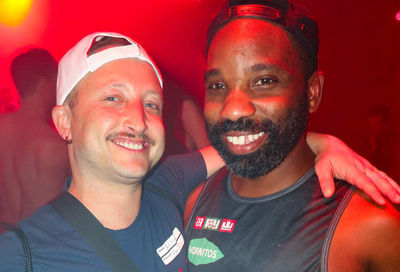On the Bright Side
Commentary: OutRight
For gay-marriage litigants, July was the cruelest month. Prior to the Washington Supreme Court decision in Andersen v. King County, there were two substantive state marriage decisions against them (New York and Connecticut); one quasi-substantive federal decision against them (the 8th Circuit, whose broad language went beyond the state constitutional ban at issue); and three procedural decisions against them upholding the propriety of ballot initiatives banning gay marriage (Massachusetts, Tennessee and Georgia).
But the day the Washington court handed down its decision may turn out to be the hardest day of all. Andersen is the most careful, closely reasoned, and comprehensive judicial opinion to date rejecting constitutional claims to gay marriage. It is much better, as a matter of conventional legal analysis and craftsmanship, than the New York Court of Appeals decision in Hernandez v. Robles rejecting gay-marriage claims in early July.
Since the principles and arguments on this issue from state-to-state, and even in the federal courts, are not that different, the Washington decision will deserve close attention from other courts. Among the courts next to consider claims for gay marriage, the New Jersey Supreme Court in particular should grapple with, and respond to, Andersen if it intends to uphold a gay-marriage claim.
Andersen shows how legislative advances for gays are a double-edged sword in litigation over marriage. Some courts upholding gay-marriage or civil unions claims have cited legislative progress — eliminating sodomy laws, making adoptions more widely available, passing employment non-discrimination laws — as evidence that times and attitudes are changing and as support for the idea that the legislature has no very good reason to withhold this last bit of progress from them.
Andersen, by contrast, cites legislative progress as a reason to deny that anti-gay discrimination should be of special concern to judges. After all, reasoned the court, gays have made a lot of legislative progress. Thus, they don’t need the protection of courts the way racial minorities do. Gays can fend for themselves in the political process, just as most interest groups do.
This is a dubious theory, since historical scholarship has shown that groups tend to get heightened judicial protection only after they’ve made legislative progress. And once they’ve gotten that judicial protection, they don’t lose it simply because the legislature begins to take their concerns seriously.
Since the court saw no reason to strictly scrutinize the exclusion of gay couples from marriage, it was very easy to uphold the law. The law need only be ”rationally related to a legitimate state interest.” The court rightly describes this form of review as ”extremely deferential” and granting the state ”nearly limitless” power to make policy as it sees fit.
The state claimed that its desire to promote procreation and child welfare were good enough reasons under this ”rational basis” standard to exclude gay couples from marriage. While they are very poor policy reasons to exclude gay couples — many heterosexual couples don’t procreate, yet they can marry — the court concluded that these were minimally ”rational” reasons for existing marriage law.
There is a bright spot for gay couples in the Andersen decision. ”We are […] acutely aware…that many day-to-day decisions that are routine for married couples are more complex, more agonizing, and more costly for same-sex couples,” wrote the court. It then listed some of the numerous ways in which marriage law helps families to deal with various crises in life, including the death or incapacity of a partner, no matter whether the couple has children.
Lest you think these are just crocodile tears from a gutless court delivering gay couples to the tender mercies of the heartless legislature, the court continued: ”But plaintiffs have affirmatively asked that we not consider any claim regarding statutory benefits and obligations separate from the status of marriage. We thus have no cause for considering whether denial of statutory rights and obligations to same-sex couples, apart from the status of marriage, violates the state or federal constitution.” The court ended with a strong suggestion that ”the legislature may want to reexamine the impact of the marriage laws on all citizens of this state.”
To the state legislature, the message seems to be this: ”Get moving on addressing the hardships faced by gay couples and their children, some of which we’ve listed for you. You don’t have to give them marriage and maybe not even all of the rights of marriage, but something needs to be done. If you don’t act, we might.”
To gay-marriage litigants, the message seems to be this: ”Go to the legislature and see what can be done about the sorts of problems you’ve identified and that we agree exist. If the legislature is unresponsive, come back to us not with a claim for the status of marriage, but with a remedial claim for the benefits and protections of marriage for your families.”
My guess is that this twin message was necessary to get the five votes needed to uphold the state’s marriage laws.
I’ve previously written that courts confronting gay-marriage claims may now see three choices: (1) order full marriage (Massachusetts); (2) deny the claims (New York); and (3) compromise on civil unions, with instructions to the legislature to decide on implementation (Vermont).
Choice No. 3 involves many complications and permutations, but it seems that the Washington court would like very much to give it a try. It’s a sensible direction for litigants, legislatures, and courts.
Dale Carpenter is a law professor. He can be reached at OutRight@metroweekly.com.
Support Metro Weekly’s Journalism
These are challenging times for news organizations. And yet it’s crucial we stay active and provide vital resources and information to both our local readers and the world. So won’t you please take a moment and consider supporting Metro Weekly with a membership? For as little as $5 a month, you can help ensure Metro Weekly magazine and MetroWeekly.com remain free, viable resources as we provide the best, most diverse, culturally-resonant LGBTQ coverage in both the D.C. region and around the world. Memberships come with exclusive perks and discounts, your own personal digital delivery of each week’s magazine (and an archive), access to our Member's Lounge when it launches this fall, and exclusive members-only items like Metro Weekly Membership Mugs and Tote Bags! Check out all our membership levels here and please join us today!




















